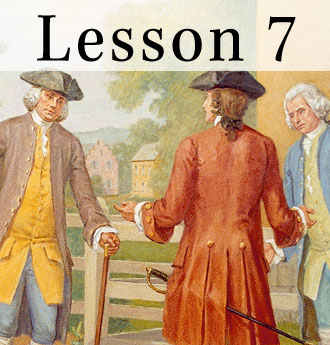Lesson 7: What Basic Ideas about Government and Rights Did the State Constitutions Include?
Madison, James (1751-1836) The "Father of the Constitution" was born to a wealthy Virginia family. He was taught at home and in private schools, then graduated from the College of New Jersey. While deciding whether to become a lawyer or minister, Madison became involved in the revolutionary cause, thereby entering state and local politics. His poor health kept him from serving in the military. In 1780, Madison was chosen to serve in the Continental Congress, where he played a major role. He was one of the most influential voices calling for a constitutional convention. He came to the Philadelphia Convention with a plan for the new government, took extensive notes on the proceedings, spoke more than 150 times, and worked tirelessly on various committees. As one of the authors of The Federalist, Madison was also a key figure in the battle for ratification. Following the convention, Madison served as a member of the U.S. House of Representatives, helping to frame the Bill of Rights and organize the executive department. Under Jefferson, Madison served as secretary of state. He then succeeded Jefferson as president. In retirement, Madison continued to speak out on public issues.
Mason, George (1725-1792) George Mason wrote the Virginia Declaration of Rights. Later, as a delegate to the Philadelphia Convention (see Lessons 9-12) Mason led the movement against ratification of the U.S. Constitution because it lacked a bill of rights (see Lesson 13). Mason did not want government in America to become like government in England, and he believed declarations of rights as limits on government were one way to prevent this.






